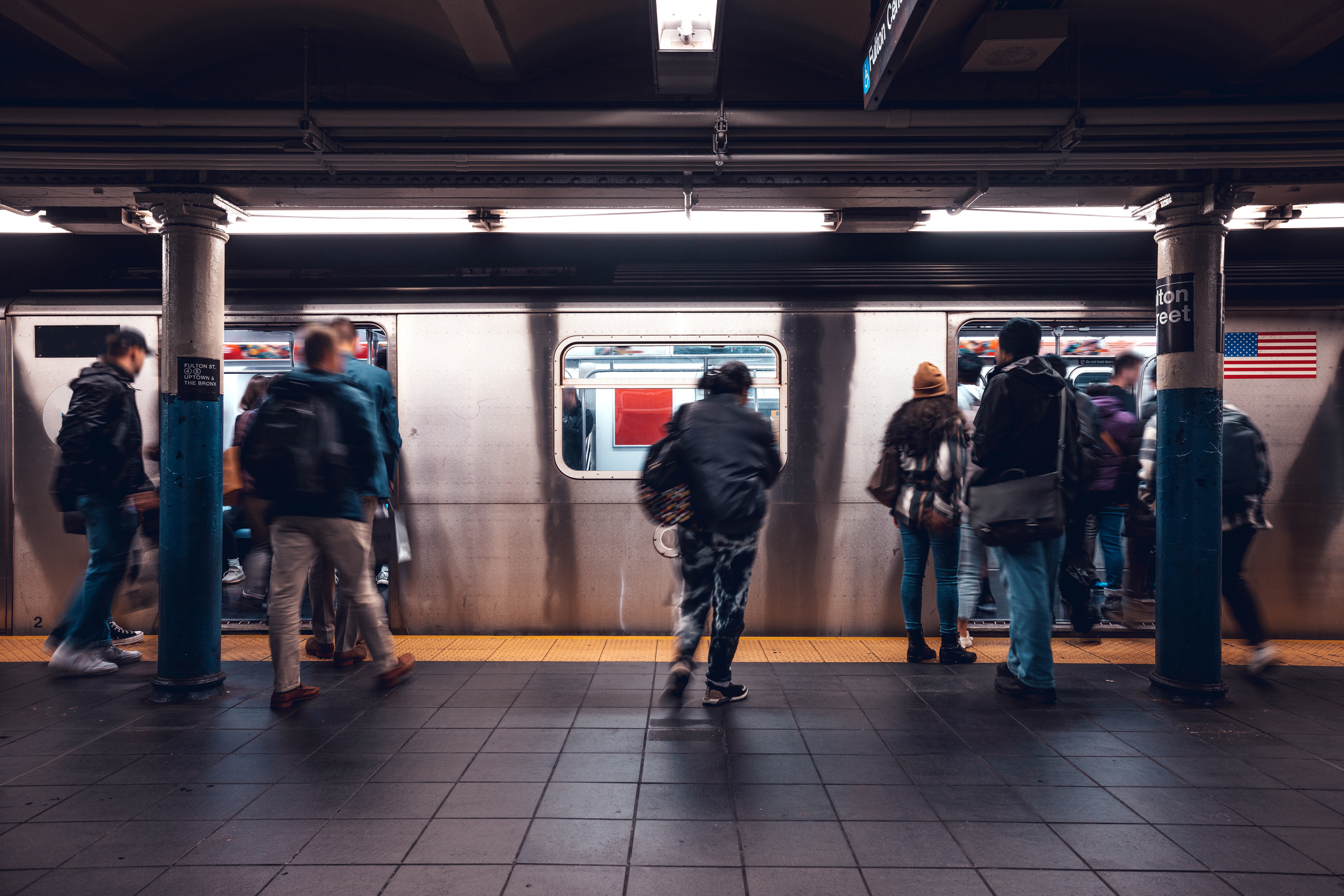NYC Subway Ride Cost Just Went Up
The MTA raised the price of an NYC subway ride cost near the end of August.


Profit and prosper with the best of Kiplinger's advice on investing, taxes, retirement, personal finance and much more. Delivered daily. Enter your email in the box and click Sign Me Up.
You are now subscribed
Your newsletter sign-up was successful
Want to add more newsletters?

Delivered daily
Kiplinger Today
Profit and prosper with the best of Kiplinger's advice on investing, taxes, retirement, personal finance and much more delivered daily. Smart money moves start here.

Sent five days a week
Kiplinger A Step Ahead
Get practical help to make better financial decisions in your everyday life, from spending to savings on top deals.

Delivered daily
Kiplinger Closing Bell
Get today's biggest financial and investing headlines delivered to your inbox every day the U.S. stock market is open.

Sent twice a week
Kiplinger Adviser Intel
Financial pros across the country share best practices and fresh tactics to preserve and grow your wealth.

Delivered weekly
Kiplinger Tax Tips
Trim your federal and state tax bills with practical tax-planning and tax-cutting strategies.

Sent twice a week
Kiplinger Retirement Tips
Your twice-a-week guide to planning and enjoying a financially secure and richly rewarding retirement

Sent bimonthly.
Kiplinger Adviser Angle
Insights for advisers, wealth managers and other financial professionals.

Sent twice a week
Kiplinger Investing Weekly
Your twice-a-week roundup of promising stocks, funds, companies and industries you should consider, ones you should avoid, and why.

Sent weekly for six weeks
Kiplinger Invest for Retirement
Your step-by-step six-part series on how to invest for retirement, from devising a successful strategy to exactly which investments to choose.
The New York City commute just got marginally more expensive, as the Metropolitan Transportation Authority (MTA) raised the price of a subway ride for the first time since 2015.
An individual subway or bus swipe increased by a little over 5%, from $2.75 to $2.90, according to the MTA. Meanwhile, a weekly unlimited pass increased from $33 to $34 (3% increase), and the 30-day pass went from $127 to $132 (4% increase). Students and seniors, who get discounted rates at half off base fare, are seeing an individual swipe go from $1.35 to $1.45. This went into effect on Aug. 20.
Additionally, fares on the Long Island Rail Road (LIRR) and Metro-North are going up by 4.5%, although the MTA notes: "Thanks to the additional 10% discount implemented in March 2022, monthly fares will remain lower than they were pre-COVID."
From just $107.88 $24.99 for Kiplinger Personal Finance
Become a smarter, better informed investor. Subscribe from just $107.88 $24.99, plus get up to 4 Special Issues

Sign up for Kiplinger’s Free Newsletters
Profit and prosper with the best of expert advice on investing, taxes, retirement, personal finance and more - straight to your e-mail.
Profit and prosper with the best of expert advice - straight to your e-mail.
It's not looking much better for drivers. E-ZPass tolls on bridges and tunnels just increased from $6.55 to $6.94, according to NBC New York, and out-of-town drivers are uneagerly anticipating the start of surge pricing, with an expected rollout in spring 2024.
NYC subway ride cost increases in context
As someone who lives in New York, of course I want to grumble about this fare increase. But also as someone who lives in New York, I feel the need to defend our subway system from any and all haters. And in this case, the MTA may have a point to raise prices.
My family and I were talking about the price hike, and my dad remembered paying well under a dollar when he was a teenager living in Brooklyn, while my sister remembered when the price for a ride was still around $2 while she was in college.
So, we pulled up the stats and ended up with some interesting measures. In the last half of the 1970s, a subway ride was $0.50, according to 6sqft. Now, using the Bureau of Labor Statistics' CPI inflation calculator, $0.50 in January 1979 has the same buying power as $2.23 in June 2023 (the most recent data available). In that sense, for someone like my dad, the price of the subway has definitely increased faster than inflation.
But the story changes for younger and newer New Yorkers. When I first moved to New York in 2010, a subway ride was $2.25. That's the same buying power as $3.17 in June 2023, per the BLS calculator. So for me, the price of a subway has actually gotten significantly lower when you factor in inflation. The last rate hike was to $2.75 in March 2015; that would be $3.55 in June 2023.
Or you can think of it in another way: the price of a slice of pizza was higher than a subway ride in New York as of last year, so we've already upset the pizza principle.
I don't doubt that this fare increase is going to make budgets tighter. But this seems like a reasonable adjustment. Ridership is still down post-2020 and it costs money to maintain — and hopefully improve — a subway system, and this hike is supposed to help address some of that.
I really will defend the subway system to any non-New Yorker or new New Yorker who comes out swinging, because it's kind of a spectacular thing. Yes, there are sometimes delays, and yes, it smells terrible and there are rats. But it's a 24/7 system that generally functions, and it's a little miracle to be able to fully cross boroughs relatively quickly for less than $3. Plus, using public transportation instead of a car is generally good for the environment.
So when I get annoyed at the news of a fare increase, I just remind myself it's cheaper than a taxi — and still lightyears better than having to own a car to get anywhere.
Related Content
Profit and prosper with the best of Kiplinger's advice on investing, taxes, retirement, personal finance and much more. Delivered daily. Enter your email in the box and click Sign Me Up.

Alexandra Svokos is the digital managing editor of Kiplinger. She holds an MBA from NYU Stern in finance and management and a BA in economics and creative writing from Columbia University. Alexandra has over a decade of experience in journalism and previously served as the senior editor of digital for ABC News, where she directed daily news coverage across topics through major events of the early 2020s for the network's website, including stock market trends, the remote and return-to-work revolutions, and the national economy. Before that, she pioneered politics and election coverage for Elite Daily and went on to serve as the senior news editor for that group.
Alexandra was recognized with an "Up & Comer" award at the 2018 Folio: Top Women in Media awards, and she was asked twice by the Nieman Journalism Lab to contribute to their annual journalism predictions feature. She has also been asked to speak on panels and give presentations on the future of media and on business and media, including by the Center for Communication and Twipe.
-
 10 Cheapest Places to Live in Colorado
10 Cheapest Places to Live in ColoradoProperty Tax Looking for a cozy cabin near the slopes? These Colorado counties combine reasonable house prices with the state's lowest property tax bills.
-
 Look Out for These Gold Bar Scams as Prices Surge
Look Out for These Gold Bar Scams as Prices SurgeFraudsters impersonating government agents are convincing victims to convert savings into gold — and handing it over in courier scams costing Americans millions.
-
 How to Turn Your 401(k) Into A Real Estate Empire
How to Turn Your 401(k) Into A Real Estate EmpireTapping your 401(k) to purchase investment properties is risky, but it could deliver valuable rental income in your golden years.